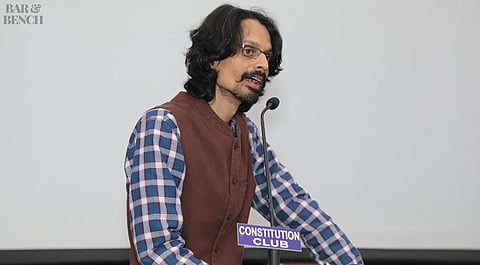
- Latest Legal News
- News
- Dealstreet
- Viewpoint
- Columns
- Interviews
- Law School
- Legal Jobs
- हिंदी
- ಕನ್ನಡ

Prof Shamnad Basheer has written to the Bar Council of India (BCI) asking it to relax the rule barring legal academics from practicing in courts.
The petition has already garnered the support of noted legal academics including Prof Madhava Menon and Prof Faizan Mustafa, Vice-Chancellor of NALSAR, Hyderabad.
It was based on Prof Basheer’s petition that the Consortium of National Law Universities recently resolved to advocate for allowing law teachers to practice in courts.
A letter addressed to BCI Chairman Manan Kumar Mishra urges him to extend support for the petition, failing which there will be no other option but to go to court.
In his petition to the BCI, Prof Basheer notes that Rule 49 of Chapter II of Part VI of Bar Council of India Rules, which precludes full-time salaried employees from appearing in courts, seems to apply to legal academics as well. However, he argues, that on an interpretation of the rule, law teachers are not necessarily barred from practicing in courts.
The petition refers to the Bombay High Court judgment in Brihanmumbai Mahanagarpalika v. The Secretary, Bar Council of Maharashtra and Goa, wherein it delved into the rationale behind Rule 49. As per the petition, the Rule hinges on three salient aspect aspects – independence of lawyers, potential conflict of duties qua employment, and ability to represent clients to the fullest possible extent.
With respect to independence of law teachers, it is stated,
“While Indian academics may not enjoy as much freedom as their Western counterparts, there is no gainsaying the fact that when compared with other full-time professionals, Indian academics enjoy far greater freedom and autonomy…
…it is logical to infer that academics can be trusted to be objective and independent whilst representing clients. The mere fact of them being “employed” is, in itself, not sufficient to deem them unworthy of independently representing clients and fighting their causes.”
Therefore, it is argued, there is no “absolute” prohibition against all “employees” from practising law.
Similarly, it is contended that there is no real conflict between the core aspects of a lawyer’s professional commitment and those of a law teacher.
On the point of advocacy to the fullest possible extent, the petition draws a parallel between Members of Parliament and legal academics practicing law. The Supreme Court judgment in Ashwini Kumar Upadhyay v. Union of India, where MPs were allowed to practice in courts, is cited for this purpose. It is stated,
“Therefore, Rule 49 ought not to be interpreted to mean that one must necessarily devote all of his/her working hours to the practice of law. Rather, so long as the nature of the two professional pursuits do not pose a conflict serious enough to compromise one’s independence and autonomy, there ought to be no bar against the practice of law for legislators. This logic should extend to law teachers as well.”
Examples of how academics have contributed to the courts over the years have also been given in the petition.
As regards putting in place safeguards to ensure that appearing in courts does not prejudice classroom teaching, the petition states that universities are best place to determine the same.
References are also made as to how relaxing the Rule would enrich clinical legal education.
“Indeed, a more active engagement with legal practice enables academics to be better teachers and paves the way for better clinical education.”
The petition laments that a number of universities are presently yet to implement clinics in their “fullest sense”. Therefore, it is contended,
“Barring legal academics from legal practice does great disservice to the idea of clinics and the need to integrate some practical training within the overall curricula of legal education. More so in a country like India where we suffer a shortage of resources, and law schools may find it easier to deploy regular faculty members to integrate a clinical approach in their classrooms, rather than hiring experienced practitioners to run full-time clinics, as is the case with the US.”
On the basis of these arguments, Prof Basheer makes an appeal to the BCI to clarify or amend the current norm prohibiting Indian legal academics from the practice of the law.
Read Prof Basheer’s petition to the BCI: